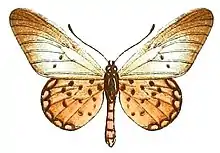Acraea diogenes
Acraea diogenes is a butterfly in the family Nymphalidae. It is found in the Democratic Republic of the Congo (from the south to Haut-Lomani and Lualaba), Angola and north-western and north-eastern Zambia.[3]
| Acraea diogenes | |
|---|---|
 | |
| Acraea diogenes in Seitz (1925) | |
| Scientific classification | |
| Domain: | Eukaryota |
| Kingdom: | Animalia |
| Phylum: | Arthropoda |
| Class: | Insecta |
| Order: | Lepidoptera |
| Family: | Nymphalidae |
| Genus: | Acraea |
| Species: | A. diogenes |
| Binomial name | |
| Acraea diogenes | |
| Synonyms | |
| |
Description
A. diogenes Suff . (55 f) is only known in the female, but suggests a thinly scaled form of the preceding species [ Acraea leucopyga ]. Forewing transparent whitish grey, at the apex and distal margin broadly darkened, with discal dots in 1 b and 2 and occasionally also with a median dot, but with no other dots. Hindwing somewhat more fully scaled, above dull grey, beneath with reddish spots; marginal band and black dots almost as in leucopyga. Southern Congo.[4]
Taxonomy
It is a member of the Acraea cepheus species group. But see also Pierre & Bernaud, 2014.[5]
References
- Suffert, E. 1904 Neue afrikanisches Tagfalter aus dem Kon. Zool. Museum, Berlin, und meiner Sammlung. Deutsche Entomologische Zeitschrift, Iris 17: 12-107.
- "Acraea Fabricius, 1807" at Markku Savela's Lepidoptera and Some Other Life Forms
- "Afrotropical Butterflies: Nymphalidae - Tribe Acraeini". Archived from the original on 2012-08-10. Retrieved 2012-05-31.
- Aurivillius, [P.O.]C. 1908-1924. In: Seitz, A. Die Grosschmetterlinge der Erde Band 13: Abt. 2, Die exotischen Grosschmetterlinge, Die afrikanischen Tagfalter, 1925, 613 Seiten, 80 Tafeln (The Macrolepidoptera of the World 13).Alfred Kernen Verlag, Stuttgart.
 This article incorporates text from this source, which is in the public domain.
This article incorporates text from this source, which is in the public domain. - Pierre & Bernau, 2014 Classification et Liste Synonymique des Taxons du Genre Acraea pdf
External links
- Die Gross-Schmetterlinge der Erde 13: Die Afrikanischen Tagfalter. Plate XIII 55 f
- Images representing Acraea diogenes at Bold